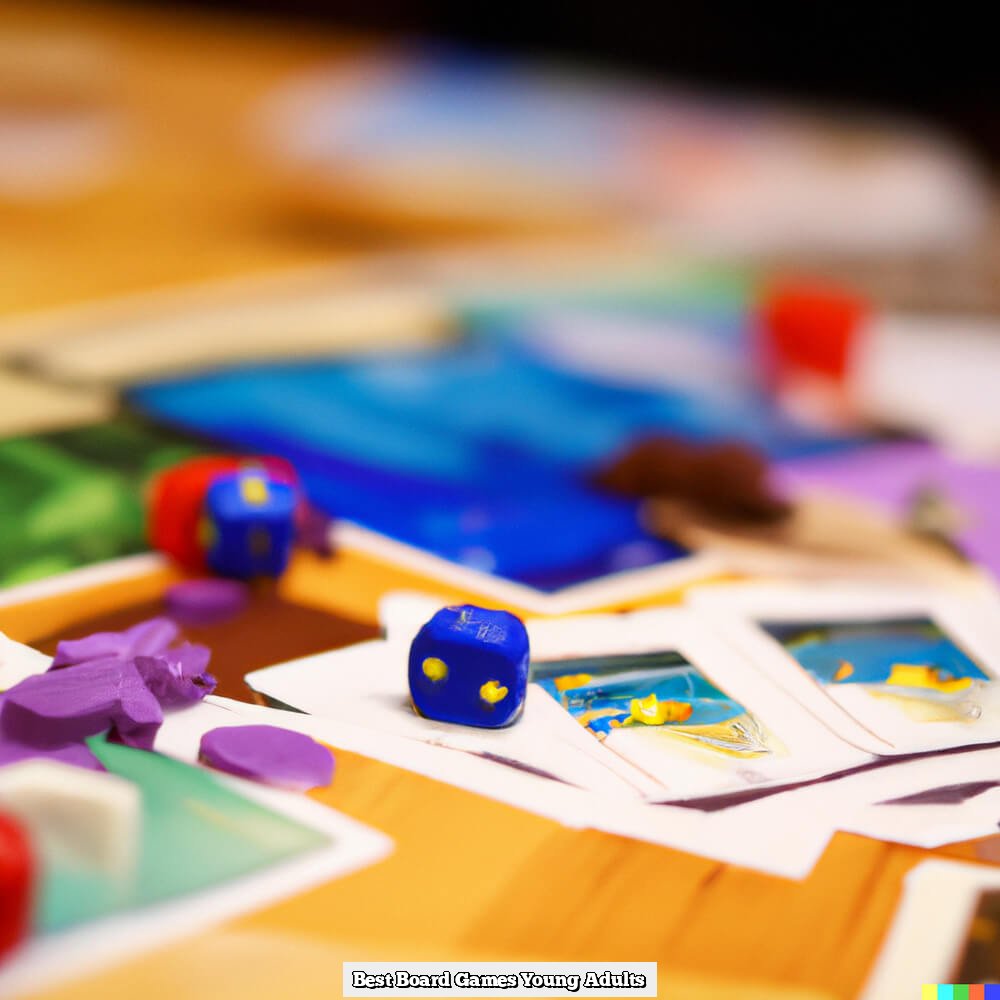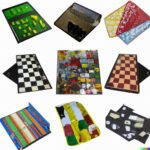Strategy board games for young kids are not only a fun pastime but also a valuable tool for enhancing their cognitive skills. Developing strategy skills at a young age can set children up for success in various aspects of life. From improving critical thinking to honing decision-making abilities, these games offer numerous benefits for early childhood development.
In today’s technology-driven world, where screens dominate children’s recreation time, introducing strategy board games provides a refreshing and enriching alternative. These games encourage kids to think strategically, plan ahead, and adapt their tactics – all essential skills that can be applied in academics, social interactions, and problem-solving situations.
Furthermore, strategic board games help children learn the importance of making choices and understanding consequences. By engaging with these games collaboratively or competitively, youngsters not only have fun but also develop crucial life skills that will serve them well as they grow older. In the following sections, we delve into the significance of teaching strategy skills early on and explore how strategy board games can positively impact young kids’ overall growth and development.
Importance of Teaching Strategy Skills to Children From a Young Age
Teaching strategy skills to children from a young age is crucial for their overall cognitive development. By engaging in strategy board games, kids are not only having fun but also honing important skills that will benefit them in various aspects of their lives. These games provide a structured environment where children can learn to think critically, plan ahead, and make decisions based on the consequences of their choices.
Here are some key reasons why it is important to introduce strategy board games to young kids:
- Development of critical thinking: Strategy board games require players to think several steps ahead and anticipate their opponents’ moves. This helps children learn how to analyze situations, weigh options, and make informed decisions.
- Improvement of problem-solving skills: By playing strategy board games, kids learn how to approach problems in a systematic way and come up with creative solutions. This skill is valuable not just in game scenarios but also in real-life situations.
- Enhancement of concentration and focus: Strategy board games often involve complex rules and multiple variables that require players to stay attentive throughout the game. This helps children improve their concentration abilities and focus for longer periods.
Overall, teaching strategy skills through board games at a young age sets a solid foundation for children’s future success. It prepares them to navigate challenges with confidence, cultivate strategic thinking habits, and develop essential life skills that will serve them well as they grow older.
How Strategy Board Games Help Improve Critical Thinking and Decision-Making Skills
Strategy board games are not just a source of entertainment for young kids; they also play a significant role in improving their critical thinking and decision-making skills. These games require players to think ahead, evaluate different options, anticipate outcomes, and make strategic choices. As children engage with strategy board games, they develop important cognitive skills that are beneficial for academic success and problem-solving in various aspects of life.
One key way that strategy board games help improve critical thinking in young kids is by encouraging them to consider multiple possibilities and consequences before making a move. By planning their strategies and analyzing the potential outcomes of each decision, children learn how to think critically and logically. This process enhances their ability to assess situations, identify patterns, and make informed choices based on available information.
Moreover, playing strategy board games can also enhance children’s decision-making skills by fostering a sense of agency and autonomy. When kids have the opportunity to make choices within the game, they learn to take ownership of their decisions and understand the impact of their actions. This hands-on experience helps them become more confident decision-makers both during gameplay and in real-life scenarios.
| Strategy Board Games for Young Kids | Critical Thinking Skills Improved |
|---|---|
| Chess | Strategic planning, pattern recognition |
| Catan Junior | Resource management, adaptability |
| Risk Junior | Risk assessment, conflict resolution |
Top 5 Strategy Board Games for Young Kids
When it comes to introducing young kids to strategy board games, selecting the right games that are both engaging and educational is crucial. Here are the top five strategy board games that are perfect for young children:
- Candy Land: A classic favorite among young kids, Candy Land not only teaches basic game mechanics but also helps develop color recognition skills. Players navigate through a colorful world of sweets by drawing cards and strategizing their path to reach the end of the board.
- Uno Moo: This kid-friendly version of the popular card game Uno incorporates a barnyard theme with animal figurines instead of cards. Children learn about matching colors and numbers while strategizing to be the first player to empty their barn of animals.
- Robot Turtles: Perfect for introducing young kids to programming concepts, Robot Turtles is a strategic board game where players use directional cards to move their turtle-shaped robots across the grid. The goal is to reach a gem without being caught by the obstacles.
- Hoot Owl Hoot.: In this cooperative game, players work together to help owls fly back to their nest before sunrise. Kids learn about teamwork and strategic planning as they strategize each move to bring all owls home safely.
- The Magic Labyrinth: This award-winning game challenges young players to navigate a maze with invisible walls using memory and spatial reasoning skills. Kids strategically plan their movements using magnetic pieces to avoid bumping into hidden barriers.
By incorporating these top strategy board games into playtime, parents and educators can help young children develop important skills such as critical thinking, decision-making, problem-solving, and social interaction in an entertaining and interactive way. These games not only provide hours of fun but also lay a strong foundation for building cognitive abilities that will benefit kids as they grow and navigate through various challenges in life.
Tips for Introducing Strategy Board Games to Young Children
Introducing strategy board games to young children can be a rewarding experience for both parents and kids. Not only do these games provide hours of entertainment, but they also offer numerous educational benefits. However, it’s important to approach the introduction of these games with care and consideration to ensure that children have a positive experience.
Start Simple
When introducing young children to strategy board games, it’s essential to start with simple and easy-to-understand games. Choose games that have clear rules and straightforward gameplay so that kids can quickly grasp the basics. Games like “Candy Land” or “Chutes and Ladders” are great options for beginners, as they introduce children to the concept of following rules and making decisions without overwhelming them.
Encourage Problem-Solving
One of the key benefits of strategy board games for young kids is their ability to enhance problem-solving skills. Encourage children to think critically and come up with solutions on their own when playing these games. Ask open-ended questions like “What do you think is the best move?” or “How can you outsmart your opponent?” This not only helps children develop their strategic thinking but also boosts their confidence in their decision-making abilities.
Make It Fun
Above all, make sure that playing strategy board games with young children is a fun and enjoyable experience. Avoid putting too much pressure on winning or focusing solely on the competitive aspect of the game.
Instead, emphasize the importance of having fun, spending time together as a family, and learning new skills along the way. By creating a positive and engaging environment, kids will be more likely to develop a love for strategy board games and continue honing their critical thinking skills in the future.
Benefits of Playing Strategy Board Games as a Family
Playing strategy board games as a family can have numerous benefits beyond just providing entertainment. It offers a unique opportunity for bonding and creating lasting memories together. Additionally, it can foster important skills such as communication, teamwork, and critical thinking among family members of all ages. Engaging in strategic gameplay as a family can also promote healthy competition in a fun and supportive environment.
Building Stronger Relationships
One of the key benefits of playing strategy board games as a family is the opportunity to build stronger relationships. Through gameplay, families can learn more about each other’s strengths, weaknesses, and decision-making styles. This can lead to increased understanding and empathy among family members, ultimately strengthening their bonds. Additionally, spending quality time together engaging in a shared activity can help create cherished memories that will last a lifetime.
Promoting Communication and Teamwork
Strategy board games often require players to communicate effectively with one another and work as a team towards a common goal. By playing these games as a family, children can learn the importance of clear communication, cooperation, and collaboration. These skills are crucial not only in gameplay but also in everyday life situations such as school projects or team sports. Family game nights can serve as a platform for practicing these important social skills in a fun and engaging way.
Fostering Healthy Competition
Healthy competition is another valuable lesson that playing strategy board games as a family can teach children. Learning how to win gracefully and lose graciously is an essential part of growing up. By engaging in friendly competition with parents or siblings during game nights, kids can develop resilience, sportsmanship, and humility. These qualities are beneficial for their emotional development and will serve them well in future endeavors both in academics and personal relationships.
How Strategy Board Games Can Enhance Social Skills in Kids
Social skills are fundamental for children to develop as they grow and interact with others. Strategy board games play a crucial role in enhancing these social skills in kids. One of the key aspects of strategy board games is that they require players to communicate, collaborate, and engage with each other throughout the gameplay. This interaction helps children express their thoughts, listen to others, and work together towards a common goal.
Moreover, strategy board games create opportunities for kids to practice good sportsmanship. Winning and losing are integral parts of playing any game, and how children handle these outcomes can significantly impact their social development. By engaging in strategy board games, kids learn valuable lessons about gracious winning, gracious losing, and the importance of respecting fellow players, regardless of the game’s outcome.
Lastly, strategy board games encourage kids to think strategically not only in terms of game mechanics but also in their interactions with others. Children learn to consider different perspectives, anticipate other players’ moves, and make decisions that not only benefit themselves but also contribute to the overall success of the group. These skills are transferable to real-life situations where effective communication, teamwork, and problem-solving are essential for successful social interactions.
| Strategy Board Games | Social Skills Developed |
|---|---|
| Chess | Communication, Critical Thinking |
| Catan Junior | Teamwork, Decision-Making |
| Hoot Owl Hoot. | Cooperation, Problem-Solving |
Resources for Finding the Best Strategy Board Games for Young Children
When it comes to finding the best strategy board games for young children, there are several resources available to help parents and educators make informed choices. One of the easiest ways to discover high-quality games is by reading reviews and recommendations from reputable sources such as parenting blogs, educational websites, and board game review sites.
These platforms often provide detailed information on gameplay, age appropriateness, and learning benefits, making it easier to select a game that aligns with your child’s interests and skill level.
Another valuable resource for finding strategy board games for young kids is your local toy store or specialty game shop. In-store staff members are usually knowledgeable about their product offerings and can provide personalized recommendations based on your child’s age, preferences, and learning goals. Additionally, many stores host game nights or demo events where families can test out different games before making a purchase, allowing you to gauge which ones resonate most with your child.
Furthermore, online retailers like Amazon and BoardGameGeek offer a wide selection of strategy board games specifically designed for young children. These platforms allow users to read reviews, compare prices, and explore different game options from the comfort of their own home.
Additionally, some websites feature curated lists or rankings of the best strategy board games for kids in specific age groups, making it easier for parents to narrow down their choices based on recommendations from experienced players and educators alike. By utilizing these resources effectively, you can ensure that you are providing your child with engaging and enriching experiences through strategy board games tailored to their developmental needs.
Conclusion
Strategy board games for young kids offer a plethora of benefits beyond just entertainment. Through these games, children can develop critical thinking, decision-making skills, and strategic planning abilities from a young age. These skills are crucial for their cognitive development and problem-solving capabilities, setting them up for success in academics and various aspects of life.
By introducing strategy board games to young children, parents and educators are not only providing them with a fun activity but also fostering skills that will benefit them throughout their lives. Learning to strategize and make calculated decisions at an early age can have a lasting impact on a child’s development, shaping their approach to challenges and opportunities in the future.
Moreover, playing strategy board games as a family not only strengthens bonds but also teaches valuable lessons in sportsmanship, cooperation, and healthy competition. These games encourage communication, teamwork, and social interaction among family members while enjoying quality time together.Ultimately, strategy board games are more than just playtime – they are valuable tools for nurturing essential skills in young children that will help them succeed academically, socially, and personally as they grow.
With the right guidance and resources, parents can introduce their children to the world of strategy games early on, setting them on a path towards lifelong learning and development.
Frequently Asked Questions
What Is the Best Strategy Game for Beginners?
The best strategy game for beginners is one that strikes a balance between being easy to understand yet challenging enough to keep players engaged. Games like Ticket to Ride or Carcassonne are great options as they are simple to learn but offer strategic depth.
What Are Good 5 Year Old Games?
When it comes to good games for 5-year-olds, options that promote learning and creativity are ideal. Games like Candy Land, Hi Ho Cherry-O, or Spot It! are excellent choices for this age group as they help develop skills while also being fun to play.
What Board Games Are Good for 3 Year Olds?
Board games for 3-year-olds should be simple, colorful, and engaging to hold their attention. Classics such as Chutes and Ladders, The Sneaky Snacky Squirrel Game, or Richard Scarry’s Busytown Eye Found It are wonderful options for young children as they incorporate basic concepts while being entertaining.

I love playing all kinds of games – from classics like Monopoly to modern favourites like Ticket to Ride.
I created this blog as a way to share my love of board games with others, and provide information on the latest releases and news in the industry.





